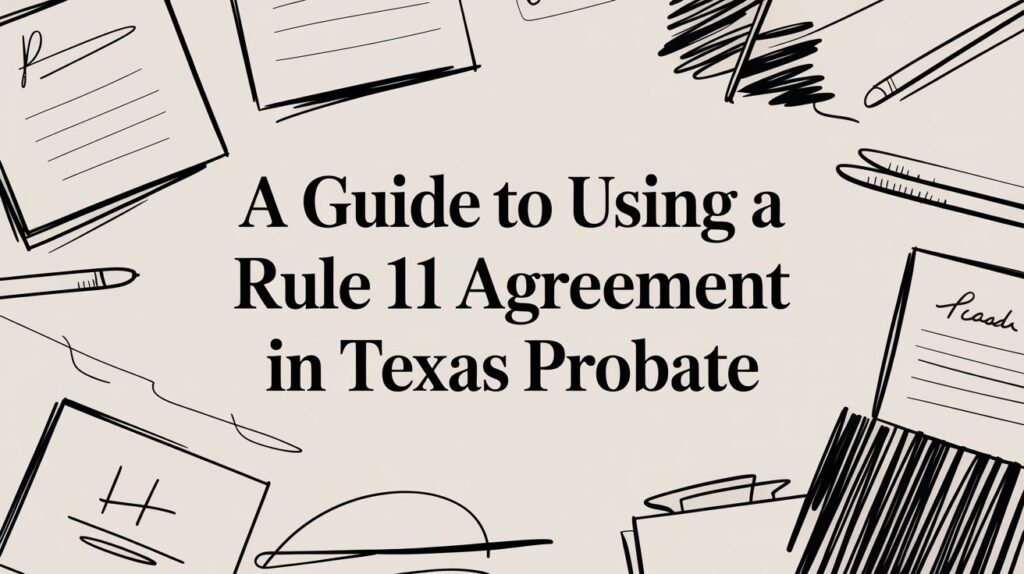If you’re asking how to probate a will in Comal County Texas, chances are you’re either named as an executor in a loved one’s will, or you’re trying to help someone navigate the estate of a deceased family member. Probate is a word that tends to trigger stress, legal confusion, and endless questions—but it doesn’t have to. With the right approach, a little preparation, and some local insight, probating a will in Comal County can be a clear and manageable process.
In this comprehensive guide, we’ll break down the probate timeline, explain your responsibilities as an executor, and share local details specific to Comal County that can make all the difference. We’ll also use real-life examples to walk you through what to expect in court, what paperwork you need, and what mistakes to avoid.
So let’s answer the big question: how to probate a will in Comal County Texas—from start to finish.
What Does It Mean to Probate a Will in Texas?
Before diving into the Comal County specifics, let’s step back. In Texas, probate is the legal process of validating a will, appointing an executor, and authorizing the distribution of the deceased person’s property. It’s also the court’s way of ensuring that debts and taxes are paid before heirs receive their share.
If a valid will exists, and it names an executor, the process is more straightforward. But without a will—or when the will is contested—probate gets more complex and time-consuming.
Knowing how to probate a will in Comal County Texas means understanding both the general state rules and the local court’s preferences.

Real-Life Example: A Comal County Story
After her father passed away in New Braunfels, Lisa discovered she had been named executor in his will. Although she lived just outside the county, she was unfamiliar with the local court’s process. A quick online search left her overwhelmed. She eventually contacted the Comal County Clerk’s Office, filed the application for probate, and appeared in court—only to realize she didn’t bring the original death certificate.
It’s a small detail, but it delayed the process by two weeks. That’s why it’s crucial to understand the local court’s expectations.
Step 1: Determine If Probate Is Necessary
Not every estate requires probate. Before filing, ask yourself:
- Was there a valid will?
- Are there significant assets (likereal estate, investment accounts, or titled property)?
- Are the heirs in agreement, or is a dispute likely?
If the decedent had only small assets or all property was held in joint accounts or living trusts, probate might be unnecessary. However, if real estate, vehicles, or other titled property needs to change ownership, you’ll almost always need to probate the will.
Understanding how to probate a will in Comal County Texas starts with identifying whether it’s truly necessary to begin the process.
Step 2: Locate the Will and File It Within Four Years
Texas law requires you to file the original will within four years of the decedent’s death. Missing this deadline could result in the estate being handled as if there were no will at all, under Texas’s intestate succession laws.
In Comal County, you must file the will with the County Clerk’s Office, along with the death certificate and an application to probate.
Local Tip
Make sure the will is the original and not a copy. Comal County courts generally won’t accept a copy unless you can prove the original was lost without fraud or destruction by intent. If you’re not sure, consult with a probate attorney familiar with the county.
Step 3: File the Application for Probate in Comal County
The application is your official request to begin probate proceedings. You’ll file this with the Comal County Clerk at the courthouse in New Braunfels.
Here’s what you’ll need:
- The original will
- A completed probate application
- Filing fee (typically around $300–$400)
- Certified death certificate

After filing, there’s a mandatory waiting period of at least 10 days before the court can hold a hearing. This allows time for notice to be posted and any contests to be raised.
Step 4: Attend the Probate Hearing
Once the mandatory waiting period is over, the court will schedule a hearing. This hearing is usually brief—around 15–20 minutes—but it’s a critical part of how to probate a will in Comal County Texas.
What Happens at the Hearing?
- The judge will confirm the validity of the will
- You’ll be asked to take an oath as executor
- If everything checks out, the judge will sign an order admitting the will to probate and appointing you as executor
Documents You May Need:
- Photo ID
- The original will
- Death certificate
- Any notices sent to heirs
- The proof of posted notice (handled by the clerk)
Once appointed, you’ll receive Letters Testamentary, which authorize you to act on behalf of the estate.
Step 5: Notify Creditors and Heirs
Now that you’re officially the executor, your job is just beginning. One of the first legal duties under Texas law is to notify:
- All known creditors
- All named beneficiaries in the will
- The general public (via a notice in the local newspaper)
In Comal County, the newspaper of record is often the Herald-Zeitung, and it’s where the notice to creditors is typically published.
Why This Matters
Failing to notify creditors can result in personal liability. It’s one of the more technical but critical aspects of how to probate a will in Comal County Texas properly.
Step 6: Inventory the Estate
Within 90 days of your appointment, you must file an Inventory, Appraisement, and List of Claims with the court, unless the will explicitly waives this requirement.
This document includes:
- Real estate owned by the decedent
- Personal property (vehicles, jewelry, etc.)
- Bank accounts and investments
- Any debts owed to the estate
If you’re unsure how to value certain items, consider hiring an appraiser. This step ensures transparency and accountability—and protects you as the executor from future disputes.
Step 7: Manage Debts and Taxes
You’ll need to settle any outstanding debts, bills, or tax liabilities before distributing assets. This includes:
- Credit card balances
- Medical bills
- Final income taxes
- Property taxes
Be cautious about distributing assets before debts are paid. If you distribute too early and leave creditors unpaid, you could be held personally responsible.
Understanding this step is a major part of how to probate a will in Comal County Texas without getting caught in costly legal traps.
Step 8: Distribute the Assets
Once debts and taxes are resolved, you’ll distribute the remaining assets according to the will. This might include:
- Transferring titles for cars or property
- Issuing checks to beneficiaries
- Coordinating with banks or brokers
It’s wise to keep receipts and maintain records of every distribution. You may be required to file a final accounting with the court, depending on the estate’s size and complexity.

Step 9: Close the Estate
The final step is filing a motion to close the estate, which essentially tells the court, “I’ve done everything I was supposed to do.”
Once approved, the court formally discharges you from your role as executor. You’ve now completed the full process of how to probate a will in Comal County Texas.
Common Mistakes Executors Make in Comal County
- Failing to file the will on time
- Not publishing the creditor notice properly
- Distributing assets before settling debts
- Ignoring required court filings
Each of these errors can delay probate—or worse, expose you to lawsuits from heirs or creditors. A local probate attorney can help prevent these missteps.
Real-Life Example: The Probate Dispute That Could’ve Been Avoided
Mark was appointed executor for his uncle’s estate in Canyon Lake. He skipped the creditor notice, thinking it was unnecessary since no debts were obvious. Months later, a credit card company filed a claim—and Mark had already distributed the estate to heirs. He ended up paying the $6,000 debt out of his own pocket.
A simple oversight turned into a personal liability—something easily avoided by following the proper steps for how to probate a will in Comal County Texas.
Alternatives to Full Probate in Comal County
Not every estate needs full probate. Some options include:
Muniment of Title
- Used when there’s a will
- No unpaid debts other than secured debts (like amortgage)
- No need for formal administration
- Faster and less expensive
Small Estate Affidavit
- Estate value is under $75,000 (not including homestead)
- No will required
- All heirs agree on distribution

These options are accepted in Comal County if the estate meets the criteria. They can be excellent shortcuts when the full probate process isn’t necessary.
Final Thoughts: Getting Probate Right in Comal County
Probate doesn’t have to be a nightmare. In fact, once you understand how to probate a will in Comal County Texas, the process becomes a manageable legal checklist. Sure, there are rules, deadlines, and forms—but with proper planning and attention to local requirements, you can carry out your responsibilities with confidence.
Whether you’re grieving a loved one or supporting someone through the probate process, having the right knowledge is empowering. And if you ever feel overwhelmed, don’t hesitate to ask for help—especially from professionals who know the ins and outs of Comal County probate.
Because in the end, probate isn’t just about closing an estate. It’s about honoring a life—and doing so the right way.








